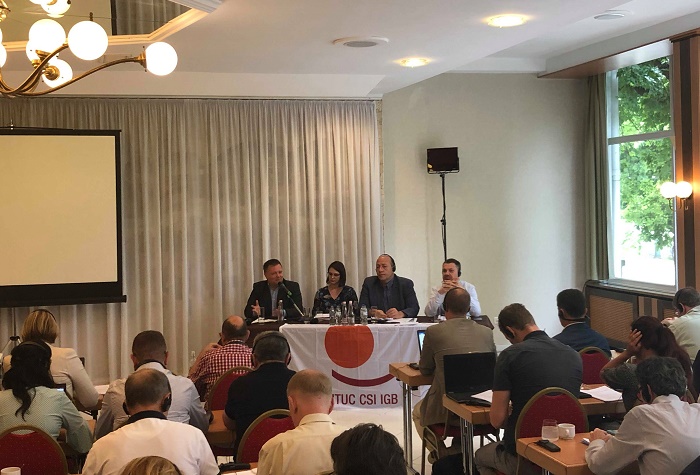Countries
Solidarity campaigns
12th PERC Summer School “Democracy and freedoms in Europe and Central Asia”

Laszlo Kordas, MASZSZ President, welcomed the School and highlighted that in Hungary collective rights, social dialogue and security were significantly reduced, while the labour code serves interests of big MNEs, virtually making implementation of the right to strike impossible, while allowing of 400 hours overtime work per year with a 3 year compensation delays. Brigitta Zsura- Szabo, LIGA, highlighted importance of the newly adopted ILO Convention on Violence and Harassment in the world of work and called for further improvement of the life-work balance and gender equality.
Owen Tudor, ITUC Deputy General Secretary, introduced the decisions of the ITUC Congress and respective pillars of the ITUC work in coming 3 years: Democracies for People: Change the Rules; A New Social Contract; Just Transition for Climate Ambition (Frontline campaigns and four pillars for action 2019). He also highlighted some recent successes of unions, including mobilisation of Croatian unions who collected 700000 signatures (23% of voters) against 67 years pension age, adoption of the ILO convention and the ILO Declaration, achievement of strong conclusions by the Committee on Application of Standards in cases or Turkey and Kazakhstan on non-implementation of the ILO Convention 87 on Freedom of Association by the governments.
Luca Visentini, ETUC and PERC General Secretary, spoke about debates of the ETUC Congress and the outcomes of the European Parliament elections, where far right and populist parties got significant voting base. He also referred to violations of fundamental freedoms within the European Union, and particular deterioration of the collective bargaining. In several EU countries during austerity period the national level collective bargaining was destroyed or restricted, in clear violation of the ILO Convention 98 on collective bargaining. Restoration of the collective bargaining is priority number 1 for the ETUC and for the PERC.
Challenges in different regions of the PERC were debated. Enisa Salimovich gave an overview of the situation in SEE countries, where working people do not sense support from the governments, where corruption flourishes, rule of law is not respected and violated by employers and by the governments. Loss of perspective forces young people to seek employment and life prospects in more equal and well-governed countries. Andrzej Adamczyk, Solidarnosc and EESC, spoke about the need to reflect upon history and moments when trade union action brought decisive historical changes on the continent. He also gave information about revised Eastern Partnership policies and perspectives for trade unions to use them. Jozef Niemec from the ETUC and Goda Neverauskaite from the PERC presented trade union work within different institutions created under Association and DCFTA agreements between the EU and Ukraine, Moldova and Georgia. Anton Leppik, PERC, presented an overview of the workers rights situation in Central Asia, while Markhaba Khalmurzaeva, Central Asian labour rights monitoring mission, informed about mechanisms for collecting and communicating reliable information about human and workers rights situation in that region.
In discussion, participants expressed deep concerns about growth of populism, far right and xenophobic attitudes in Europe, destructible role of American Chamber of Commerce and seduction of state officials to its ideology, wide spread corruption and growing precarisation, unequally shared growth benefits that favour rich and MNEs, but discriminate workers and SMEs, social dumping and migration, unfair taxation, gender inequalities and poor employment opportunities for young people. Jeroen Beirnaert, ITUC Human and Trade Union rights director summarised the debates placing developments in Europe in a global context of shrinking democratic space.
ETUC and ITUC wage increase campaigns were debated, with the pressing need to increase minimal wage to the level of decent living, but also to develop collective bargaining as mechanism for fairer wealth redistribution.
Sergeus Glovackas, ILO-ACTRAV desk officer for Europe and Central Asia, informed about outcomes of the centenary International Labour Conference, particularly adoption of the ILO Convention and ILO Declaration on future of work, about recent ratification of ILO conventions in the region.
The School discussed programme for the PERC action in the next statutory period in a view of preparing of the 4th General Assembly.
Source:ITUC
